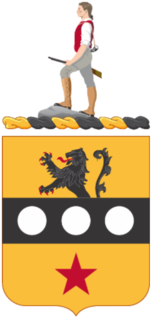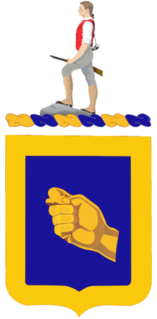The 307th Cavalry Regiment was a cavalry unit of the United States Army during World War I and the interwar period. It was activated in early 1918 but broken up in the middle of the year to form new artillery units. The unit was recreated as a Virginia Organized Reserve unit during the interwar period, and was converted into a tank destroyer battalion shortly after the United States entered World War II.

The 305th Cavalry Regiment was a cavalry unit of the United States Army during World War I and the interwar period. It was activated in early 1918 but broken up in the middle of the year to form new artillery units. The unit was recreated as a Pennsylvania Organized Reserve unit during the interwar period, and was disbanded after the United States entered World War II.

The 306th Armored Cavalry Regiment was a District of Columbia-based reconnaissance unit of the United States Army Organized Reserve Corps that briefly existed after World War II. The 306th ACR later became a group before being inactivated in 1959.

The 304th Cavalry Regiment was a cavalry unit of the United States Army during World War I and the interwar period. It was activated in early 1918 but broken up in the middle of the year to form new artillery units. The unit was recreated as a New York Organized Reserve unit during the interwar period, and was converted into a tank destroyer battalion after the United States entered World War II.

The 303rd Armored Cavalry Regiment was a New York-based reconnaissance unit of the United States Army Organized Reserve Corps that briefly existed after World War II.

The 302nd Cavalry Regiment was a cavalry unit of the United States Army during World War I, the interwar period, and the Cold War. It was activated in early 1918 but broken up in the middle of the year to form new artillery units. The unit was recreated as a New Jersey Organized Reserve unit during the interwar period, and was converted into a tank destroyer battalion after the United States entered World War II. Reactivated in 1971 and 1973 in the Army Reserve, it was represented by two squadrons in the 100th Division (Training).

The 301st Cavalry Regiment was a cavalry unit of the United States Army during World War I and the interwar period. It was activated in early 1918 but broken up in the middle of the year to form new artillery units. The unit was recreated as a New York Organized Reserve unit during the interwar period, and was converted into a signal aircraft warning regiment after the United States entered World War II.

The 309th Cavalry Regiment was a cavalry unit of the United States Army during World War I and the interwar period. It was activated in early 1918 but broken up in the middle of the year to form new artillery units. The unit was recreated as a North Carolina Organized Reserve unit during the interwar period, and later moved to Georgia in the early 1930s. It was converted into a signal aircraft warning regiment after the United States entered World War II.

The 310th Cavalry Regiment was a cavalry unit of the United States Army during World War I and the interwar period. It was activated in early 1918 but broken up later that year to form new artillery units. The unit was recreated as a Tennessee Organized Reserve unit during the interwar period, and later moved to Georgia in the early 1930s. It was disbanded after the United States entered World War II.

The 311th Cavalry Regiment was a cavalry unit of the United States Army during World War I and the interwar period. It was activated in early 1918 but broken up later that year to form new artillery units. The unit was recreated as a Texas Organized Reserve unit during the interwar period. It was disbanded after the United States entered World War II.

The 312th Cavalry Regiment was a cavalry unit of the United States Army during World War I and the interwar period. It was activated in early 1918 but broken up later that year to form new artillery units. The unit was recreated as an Oklahoma, Arizona, New Mexico, and Colorado Organized Reserve unit during the interwar period. It was converted into a signal aircraft warning regiment after the United States entered World War II.

The 313th Cavalry Regiment was a cavalry unit of the United States Army during World War I and the interwar period. It was activated in early 1918 but broken up later that year to form new artillery units. The unit was recreated as a Kentucky Organized Reserve unit during the interwar period and was later transferred to Indiana. It was disbanded after the United States entered World War II.

The 314th Cavalry Regiment was a cavalry unit of the United States Army during World War I and the interwar period. It was activated in early 1918 but broken up later that year to form new artillery units. The unit was recreated as a Kentucky Organized Reserve unit during the interwar period and was later transferred to Ohio. It was converted into a signal aircraft warning regiment after the United States entered World War II.

The 317th Cavalry Regiment was a cavalry unit of the United States Army during the interwar period. The unit was activated as an Illinois Organized Reserve unit during the interwar period. It was disbanded after the United States entered World War II.

The 318th Cavalry Regiment was a cavalry unit of the United States Army during the interwar period. The unit was activated as an Illinois Organized Reserve unit during the interwar period. It was converted into a signal aircraft warning regiment after the United States entered World War II.

The 319th Cavalry Regiment was a cavalry unit of the United States Army during the interwar period. The unit was activated as a Michigan Organized Reserve unit during the interwar period. It was converted into a tank destroyer battalion after the United States entered World War II.

The 321st Cavalry Regiment was a cavalry unit of the United States Army during the interwar period. The unit was activated as a Missouri and Arkansas Organized Reserve unit during the interwar period. It was converted into a signal aircraft warning regiment after the United States entered World War II.

The 322nd Cavalry Regiment was a cavalry unit of the United States Army during the interwar period and from the Cold War to the early 1990s. The unit was activated as an Iowa and Minnesota Organized Reserve unit during the interwar period. It was converted into a tank destroyer battalion after the United States entered World War II. Reactivated in 1971 in the Army Reserve, it was eventually represented by two squadrons of the 89th Division (Training) before both were inactivated in the mid-1990s.

The 323rd Cavalry Regiment was a cavalry unit of the United States Army during the interwar period. The unit was activated as a California, Washington, and Oregon Organized Reserve unit during the interwar period, although it was later relocated entirely to California. It was converted into a signal aircraft warning regiment after the United States entered World War II.

The 324th Cavalry Regiment was a cavalry unit of the United States Army during the interwar period. The unit was activated as a Wyoming, Utah, Idaho, and Montana Organized Reserve unit during the interwar period, although it was later relocated entirely to California. It was converted into a tank destroyer battalion after the United States entered World War II.




















